 |
| |
e-newsletter of the Centre for Environment Education |
|
|
 |
| November 1-30, 2015 |
|
 |
|
 |
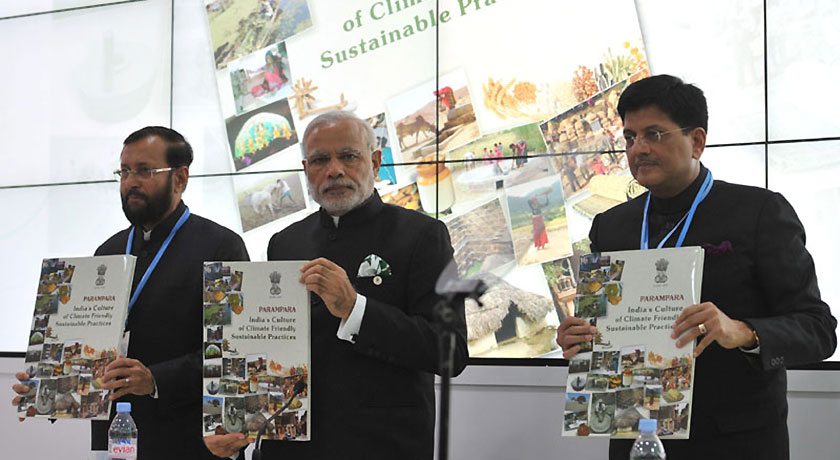 |
| The Hon’ble Prime Minister of India Shri Narendra Modi launched the Parampara catalogue. |
 |
Parampara catalogue launched at COP 21 |
The Parampara catalogue was launched by the Hon’ble Prime Minister of India, Shri Narendra Modi, at the India Pavilion of Conference of Parties (COP 21) in Paris on November 30, 2015. Hon’ble Minister of State (I/C) for Environment, Forest and Climate Change Shri Prakash Javadekar and Hon’ble Minister of State with Independent Charge for Power, Coal, New and Renewable Energy, Shri Piyush Goyal were present on the occasion.
The Parampara Catalogue - developed for the Ministry of Environment, Forest and Climate Change, Government of India, by CEE - is a collection of a range of climate friendly traditions and practices from across the country, which promotes more sustainable lifestyles, sustainable production and consumption. The catalogue groups these practices of India under the themes of solar and wind energy, agriculture, biodiversity, food, health, shelter, textiles and clothing, and water. These living traditions are an integral part of the social and cultural fabric of India and have been selected on the basis of their relevance to climate change, their perceived usefulness in climate change mitigation and adaptation, and relatability to energy and water conservation, recycling and environment friendly lifestyles.
|
|
|
|
|
 |
|
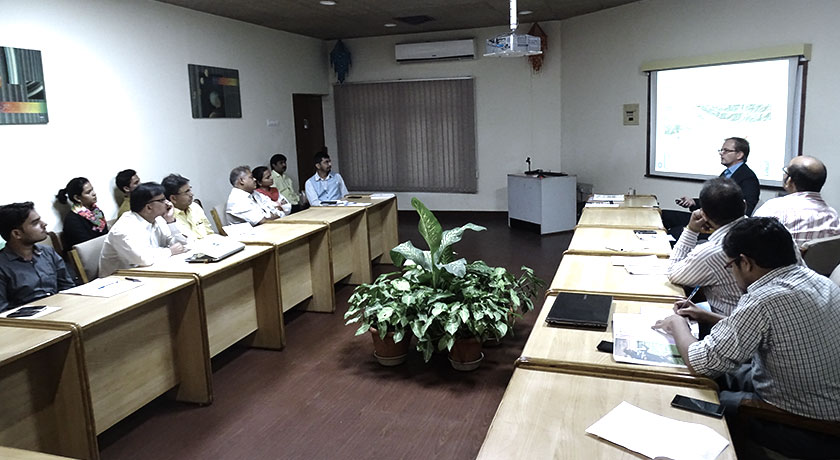 |
| The meeting highlighted ways in which air quality and climate change challenges could be tackled. |
 |
|
Roundtable meeting on air pollution |
A roundtable meeting of stakeholders, aimed at bringing together NGOs and individuals concerned with air quality and climate change, was organized in Aliganj, Lucknow, by CEE North, in association with the U.S. Embassy, New Delhi.
Over 30 participants attended the open discussion wherein Ms. Preeti R. Kanaujia from CEE spoke about the role of education and communication in creating public awareness for reducing air pollution, especially vehicular pollution. Mr. Umesh Rustogi from Science City, Ahmedabad, spoke on how the understanding of the science of air pollution could help in demonstrating its effect on people, plants and materials.
Mr. Mark Azua, Assistant Cultural Affairs Officer, U.S. Embassy gave the background of the meeting and introduced the key expert speaker - Mr. Mathew Scott Petersen, Chief Sustainability Officer, L.A. Mr. Petersen highlighted the ways in which air quality and climate change challenges were being tackled, and stated as to how this experience could help the developing countries. Participants interacted with the experts and clarified their questions.
|
 |
|
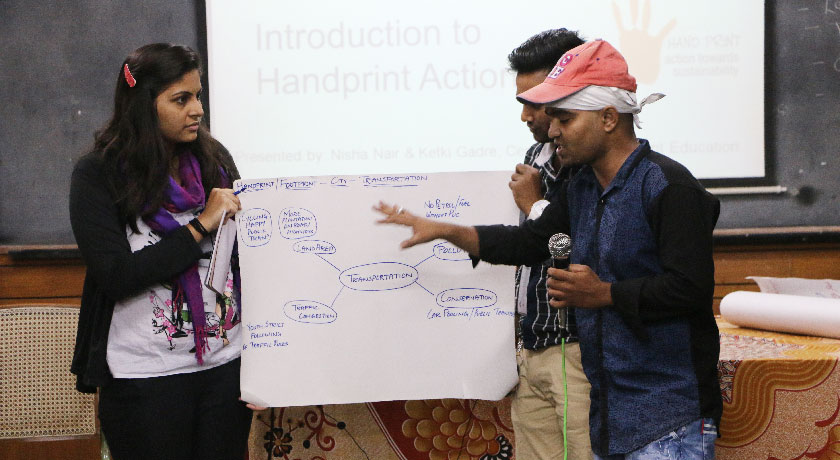 |
| COY aimed at strengthening the visibility of actions and the expertise of youth in favour of a more sustainable lifestyle. |
 |
| COY witnesses interaction on environment and development |
YOUNGO, an observer constituency of youth non-governmental organizations of The United Nations Framework Convention on Climate Change (UNFCCC), organises preparatory meetings called Conference of Youth (COY), which help build their capacity to participate in the UNFCCC negotiation process. The eleventh edition of the Conference of Youth (COY 11) was held simultaneously in Paris and different cities around the world, from 26th to 28th November, 2015, prior to COP 21.
In India, CEE and the Indian Youth Climate Network (IYCN) organized COY-11 at the CEE campus in Ahmedabad. It aimed at generating an unprecedented mobilization, to build a real momentum, and strengthen the visibility of actions and the expertise of youth from the South Asian region in favour of a more sustainable and desirable lifestyle. The participants were introduced to the science of climate change, its impacts and adaptation and mitigation actions taken at international, national and local levels. Role play activity helped the participants to understand the negotiation processes and issues at stake while taking decisions to address the challenges.
An input session on the importance of communication strategy to generate support for the initiatives was conducted. Participants from Ahmedabad and other local COYs like Tokyo and Paris got connected to interact on various topics pertaining to environment and development. The inputs by participants will be put in the manifesto that will be presented to the world leaders by youth representatives at the twenty–first session of the Conference of Parties (COP 21).
|
 |
|
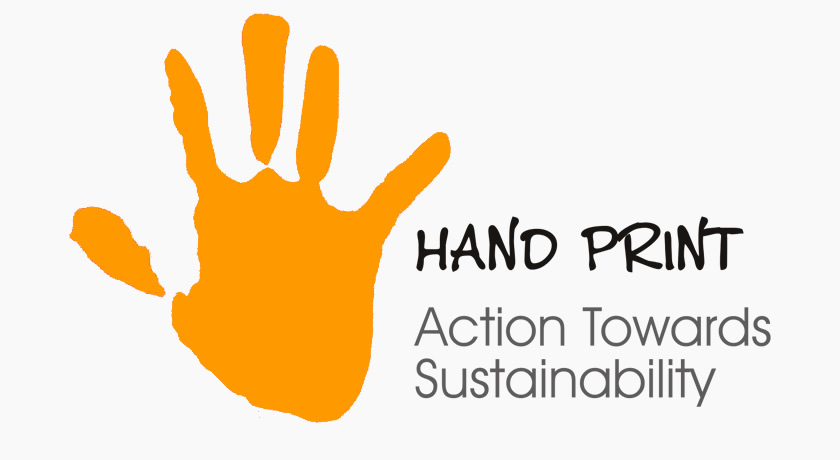 |
 |
|
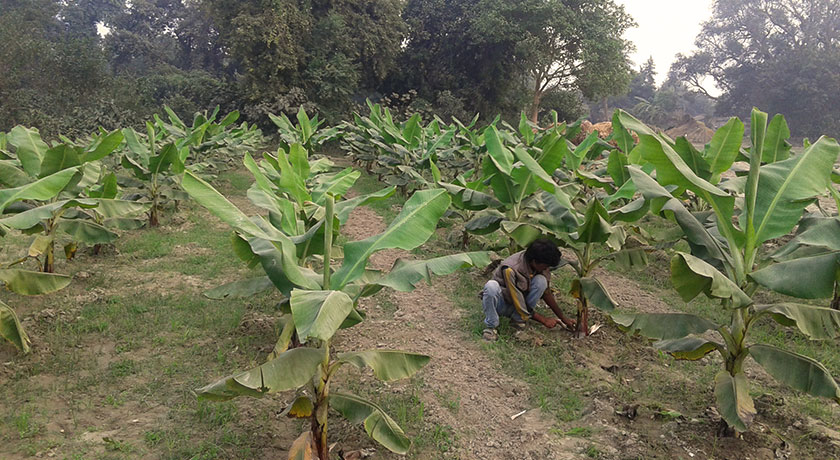 |
| Activities included demonstration of organic farming and setting up of vermi composting pits. |
 |
|
Community activities in ‘Dolphin’ villages |
Under the ‘Ganges River Dolphin - Conservation Education Programme’, CEE Bahraich and Bettiah office initiated the demonstration of organic farming wherein the use of vermi-compost and bio-pesticides was promoted. Furthermore, banana and papaya cultivation was promoted along with vegetable farming on the river bed. Pointed gourd plantation covering seven to eight ‘bigha’ land was also initiated with five beneficiaries in two project villages. A nursery for onion, cauliflower and other species cultivation was prepared for further transferring it to the riverside farmlands.
At the Bahraich project location, nine vermi-composting units have been set up in three ‘Dolphin’ villages while more are being planned during December. Ten vermi pits were demonstrated in Bettiah covering five ‘Dolphin’ villages. To promote the message of dolphin conservation, a poster in Hindi, targeting the ‘Dolphin’ village community, was developed and disseminated.
|
|
 |
|
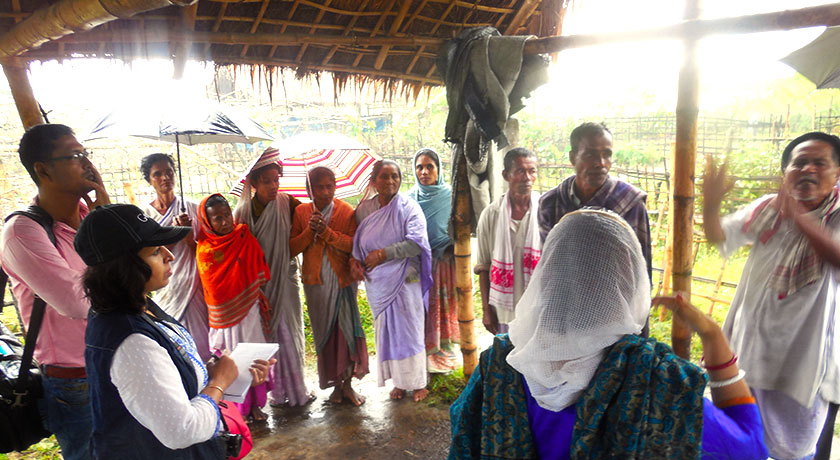 |
| The workshop focused on climate change impacts and adaptation measures in the eastern Himalayas. |
 |
|
Media Workshop on ‘Adaptation to Climate Change in the Indian Himalayan Region’
|
CEE and The Third Pole (TTP) – under the Indian Himalayas Climate Adaptation Programme (IHCAP) of the Swiss Agency for Development and Cooperation (SADC) - jointly organized a three-day media workshop on adaptation to climate change in the Indian Himalayan Region in Jorhat and Majuli, Assam, from 2nd -5th November, 2015.
The workshop focused on climate change impacts and adaptation measures in the eastern Himalayas, with a special focus on the Brahmaputra basin. The subject was discussed and presented in a variety of facets such as its impacts on precipitation and agriculture, especially on tea and rice, horticulture and extreme climate events such as floods and entailing erosion. The workshop included a field trip to Majuli and Salmora to facilitate ground-level reportage of adaptation to climate change and interactions with the community facing soil-erosion problems. The participants also got an overview of the predominant agricultural practices and occupations such as cattle rearing and mask-making in the island. Presentations included those from Tocklai Tea Research Institute, Tea Research Association, Jorhat.
Experts from the Rain Forest Research Institute, Jorhat, of the Indian Council of Forestry Research & Education, presented the incidence of Pine mortality and dwarfing/stunted growth of Siroy Lily in Manipur. Furthermore, officials from the Brahmaputra Board shared the various measures undertaken to mitigate erosion in the island of Majuli. Presentations on the second day revolved around climate change impacts on agronomy, agro-meteorology and fisheries sector in Assam.
|
|
 |
|
Nature Camps for NGC Schools |
CEE North organized four nature camps during November for the eco-club schools of Bareilly, Bahraich and Balrampur districts. As part of CEE North's association with the Uttar Pradesh Forest Corporation (UPFC), the State Ecotourism Nodal agency, a three-day and two-night nature camp was organized for a school from Bareilly at the Katarniaghat wildlife sanctuary. The school from Bareilly, involved in the NGC and CFP programme, participated in the camp from 16-18 November, 2015.
A group of 22 students from class six to eight of Rikki Singh Girls Inter College, Bareilly, along with three teachers, travelled to Katarniaghat by road with the CEE team. The nature camp module was woven around the various aspects of nature and cultural heritage, even as the boat ride in Girwa River made the students familiar to the aquatic biodiversity including ‘gharial’, crocodile, water birds and dolphins.
Three more camps were conducted from November 25 to December 1, 2015 under the National Nature Camping Programme (NNCP), supported by the Ministry of Environment, Forest and Climate Change. The NGC schools from Balrampur and Bahraich district took part in this camp at the Suhelwa Wildlife Sanctuary. Over 120 students attended the camp along with their teachers.
Nature trails inside the forest helped the students to observe the trees closely, see leopard pugmarks, and watch a variety of birds and butterflies, even as ‘Tapovan’- a working farm, attracted the children to explore more about the agricultural biodiversity.
|
|
|
 |
CEE is the ENVIS centre on Environmental Education (EE). As an ENVIS centre, CEE caters to the information needs of environmental educators. Write to the CEE ENVIS Centre at [email protected]
|
|
|
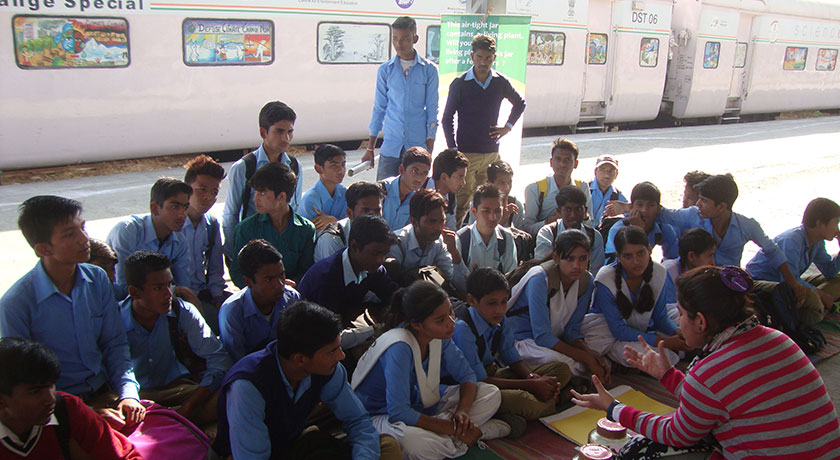 |
| Students were given the opportunity to put forth their thoughts through drawings, slogans, debates, speeches, quizzes, games and puzzles. |
 |
|
SECAS related programmes in the Indian Himalayan Region |
CEE and Indian Himalayas Climate Adaptation Programme (IHCAP) have developed a programme in accordance with the Science Express Climate Action Special (SECAS) to draw focus on climate change issues in the Indian Himalayan Region. As part of this, pre-train and platform activities were conducted at Amb Andaura and Churaru Takarla in Himachal Pradesh, Samba and Udhampur in Jammu & Kashmir, and Haridwar and Lalkuan in Uttarakhand.
Pre-train activities and platform activities comprised of introducing the SECAS and its significance, raising awareness of climate change issues, mini science experiments and competitions. Students and teachers were briefed about the history of Science Express, its purpose and the current thematic focus. Climate change and its impacts in the Indian Himalayan Region were discussed, even as students were given the opportunity to put forth their thoughts through drawings, slogans, debates, speeches, quizzes, games and puzzles. Through an activity named “Spread the word” and “Check your emissions”, students were informed of the positive actions that could be taken on a daily basis to decrease carbon emissions.
In another activity titled “Take your pick”, statements were displayed and the students were asked to discuss whether they agreed/ disagreed with the statement and give reasons for the same. Students also performed plays on issues related to environment and climate change, like the students of Government Higher Secondary School, Nud, Samba, who presented a play on Mother Earth. |
 |
|
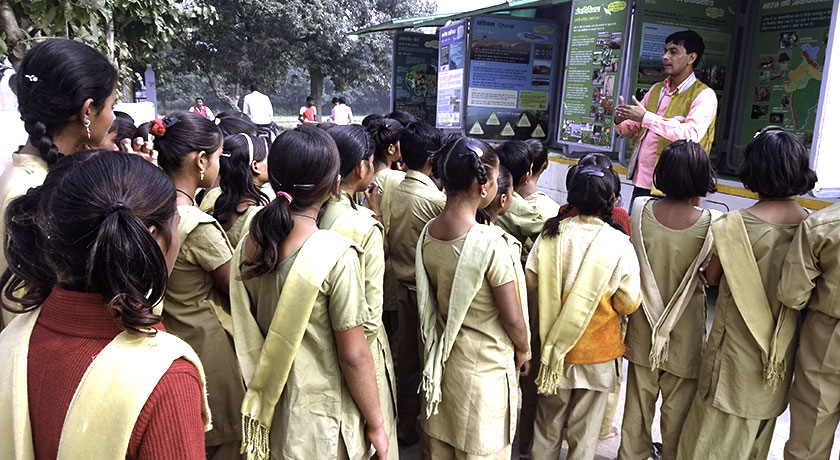 |
|
| The mobile exhibition presents the vivid biodiversity of Uttar Pradesh. |
 |
Prakriti Bus in Faizabad district |
A mobile exhibition based on the biodiversity of Uttar Pradesh, 'Prakriti Bus' was initiated as a collaborative effort of Uttar Pradesh State Biodiversity Board, Lucknow University, and CEE North. As part of the RCE Lucknow network activities towards education for sustainable development, CEE partnered with the University of Lucknow to implement this initiative. It began its journey in Uttar Pradesh in August 2014, and during its travel, the mobile exhibition has covered Lucknow, Barabanki, Kannauj, Unnao, Hardoi and Sitapur districts of Uttar Pradesh.
In its second phase, it reached Faizabad after Kanpur on November 3, 2015, wherein an event was organized at the forest office of the district where Mr. Ravi Kumar Singh, Divisional Forest Officer, Faizabad District, along with Shri Rajendra Kumar Pandey, District Inspector of Schools, Faizabad welcomed the bus by cutting the ribbon. Ms. Neha Singh from CEE spoke about the significance of the bus.
The bus, which stayed in Faizabad for a month, visited over 14 schools covering 12,638 students and teachers, and 1,300 community members. During its stay, the bus was taken to Saryu Ghat during Kartik Purnima Mela, and Guptar Ghat, Faizabad, wherein the devotees were briefed about the vivid biodiversity of Uttar Pradesh. |
 |
|
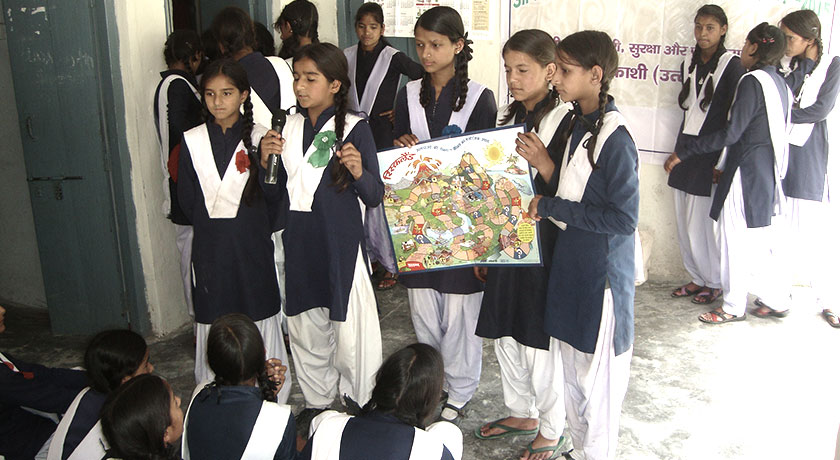 |
|
| The programme also focused on disaster risk reduction, climate change and sustainable mountain development. |
 |
Psychosocial care programme initiated in Uttarkashi |
CEE-JSW initiated an intervention named “Rebuilding Faith” in Uttarkashi district wherein a psychosocial care programme named “Umang” for all was undertaken in order to rebuild faith and restore education in the worst hit areas of Bhatwari, Dunda and Chinyalisaur. The programme, which aimed at awareness generation and capacity building of the school community, also focused on disaster risk reduction, climate change and sustainable mountain development.
A variety of activities including games, mini lectures, brainstorming sessions and situational analysis, to provide information on various disasters like earthquakes, floods, landslides etc, were conducted. Various methods such as Drop Cover Hold and Stop Drop Roll were also taught. The School Disaster Management Plan was prepared, and the School Disaster Management Committee was formed. Assessing the structural integrity of the school building, identifying safe and unsafe areas in school, and hazard mapping of the school was also conducted with the help of school disaster management committee.
The programme also focused on hygiene and sanitation, waste management and Clean/ ‘Nirmal’ Ganga. Schools were provided with IEC material developed by CEE namely, year planner on hygiene and sanitation, risk land kit, disaster awareness brochure, Paryavaran Mitra posters, and CO2 Pick Right booklet. |
 |
|
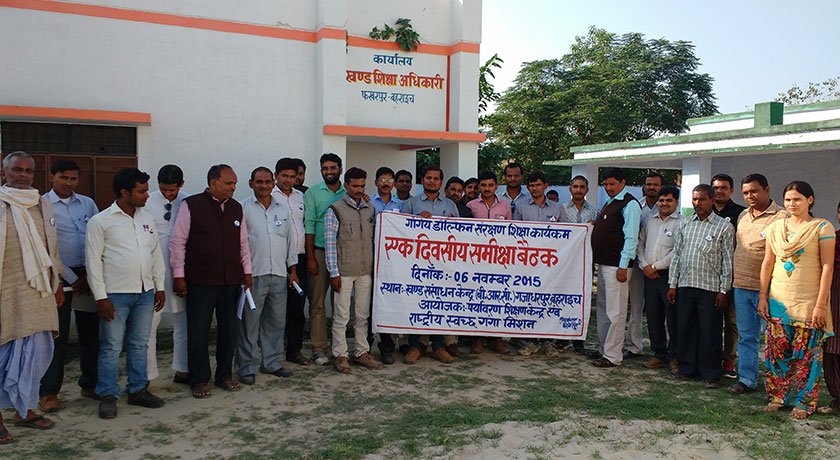 |
| The review meet facilitated the sharing of experiences of ‘Dolphin’ schools. |
 |
|
‘Dolphin’ school teachers’ review meet |
A one day teachers’ review meet was conducted to get feedback on the activities of the Dolphin manual, and facilitate the sharing of experiences of ‘Dolphin’ schools. CEE, with the help of a partner NGO, conducted two review meets in Bijnore and Bahraich district. Over 30 teachers participated in the meet held at the Bijnore Dolphin School cluster on November 5, 2015. Another review meet was held on November 6, 2015 at the Mahsi cluster of Bahraich district, wherein 33 teachers from over 35 ‘Dolphin’ schools participated.
|
 |
|
|
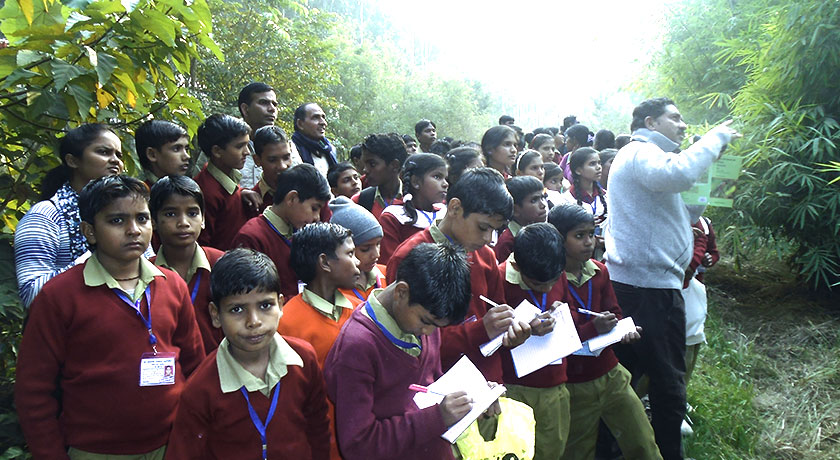 |
| Bird watching during the programme. |
 |
|
Nature tours in CFP schools |
CEE North implemented the Children’s Forest Programme (CFP) in Bareilly District with the support of Uttar Pradesh Forest Department (UPFD) and financial assistance from JICA support of Uttar Pradesh ‘Participatory Forest Management and Poverty Alleviation’ (PFMPA) project. After a successful Lucknow run, the programme attempts to cover 50 schools in Bareily, in a span of three years (2015-2017).
The main focus of the programme is to sensitize the students towards the value and role of trees and forests in our life by involving them in the tree plantation and nurturing activities. CEE Bareilly team initiated a day long nature tour and trail in the Forest Research Centre and Reserve (FRCR) for CFP schools. Over eight nature tours were organized for eight CFP schools, where around 862 students and teachers participated. The forest officials educated the students on the tree diversity found on the campus. Various educational activities, focusing on nature as well as on the individual’s role in conservation, were conducted. |
 |
|
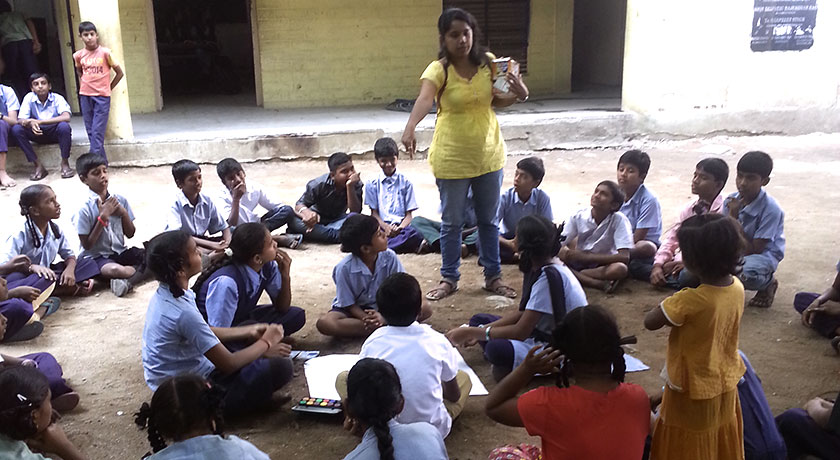 |
| A collage making activity on green environment was organised. |
 |
|
National Pollution Prevention Day celebrated in schools |
On the National Pollution Prevention Day, observed on December 2, 2015, a collage making activity on green environment was organised by CEE Hyderabad. The event required the children to utilize the natural waste material found within the school campus to represent the green environment.
CEE Hyderabad, in association with Humane Society International, also organized a signature campaign and an oath taking programme at the secondary school level. This programme focused at reducing the threats caused to the birds by the Chinese manja during Uttarayan.
Remove photo.
|
 |
|
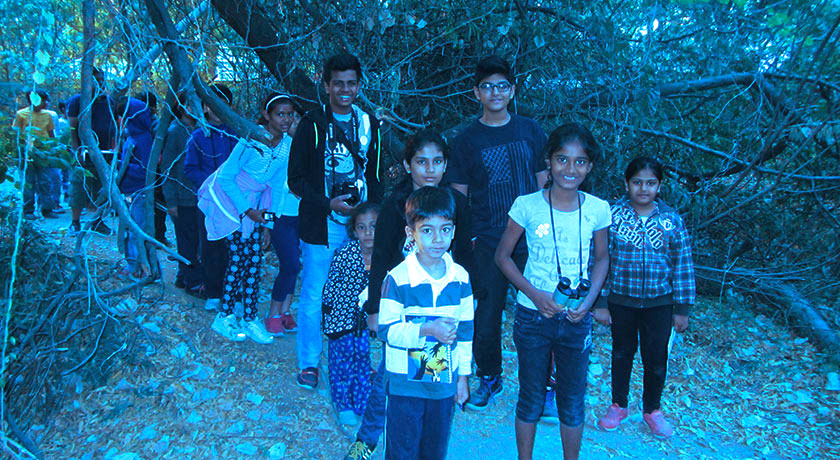 |
| Participants at the Winter Night Camp were thrilled during the night zoo trail. |
 |
|
Outdoor learning at Sundarvan |
As part of the CEE KA BIOSCOPE programme, more than 80 students divided in two batches, visited Sundarvan from Rachana School, Ahmedabad. They learnt about nature, its importance, and Sundarvan’s role in nature conservation. A nature trail teaching them the importance of various species of plants and animals at the zoo and a snake awareness programme shedding light on reptiles, snake myths, importance of snakes and first aid measure for snake-bite, were conducted.
A Green birthday celebration took place on November 21, 2015, wherein the children were engaged in outdoor adventure activities such as learning about ducks and geese, sensational snakes, bats echolocation game, face painting and getting tree-bark prints.
With an aim to kindle an interest in Ornithology among people, Sundarvan also organized a birdwatching trip to Pariej wetland on November 22, 2015.
Sundarvan also conducted its first ever Winter Night Camp for seven to fifteen year olds within the park premises. Various activities such as the night zoo trail, spider watch, campfire stories, bird watching and fun with clay dough, were conducted.
|
|
 |
 |
This message is sent to you by Centre for Environment Education, Thaltej Tekra, Ahmedabad, India and delivered by [email protected]
© CEE 2015 Editorial: Bindu Prashanth, Divika Hinger Design: Pankaj Gorana |
|
|
|
|